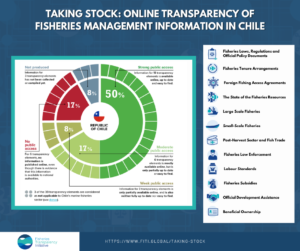Support for the FiTI in Latin America compatible with Escazu Agreement

With commitments from the governments of Ecuador and Chile, the Fisheries Transparency Initiative (FiTI) continues to gain momentum in Latin America. This progress is critical not only for improving transparency and participation in fisheries management in the region, but also for the successful implementation of the Escazu Agreement.
Many organisations have recognised a lack of transparency as one of the root causes of fisheries management failures, contributing to overfishing and the marginalisation of important groups, including small-scale coastal fishers. Because of the mounting negative international attention marine fisheries have received, transparency is essential for governments and the fishing industry to demonstrate responsible and sustainable practices.
Fisheries transparency is especially critical for Latin America and the Caribbean. Wild capture fisheries are an irreplaceable source of employment and food security for millions, and the fishing sector sustains unique and diverse cultures. Many countries in the region also have industrial fishing activities that provide critical economic benefits and revenues. Yet managing fisheries is extraordinarily difficult, with governments having to balance multiple and, often, competing objectives. The climate crisis is making this challenge especially complex and urgent.
As the need for fisheries transparency became apparent, the FiTI was launched in 2017. Following a two-year global consultation, FiTI’s founding marked the first time that an internationally agreed-upon standard on transparency in the fisheries sector was produced.
The FiTI’s foundation lies with Principle 10 of the Rio Declaration – also recognised as a core principle for the Escazu Agreement – which declares that citizens have the right to be informed about how their environment is managed and to be included in decision-making processes. However, the compatibility between the FiTI and the Escazu Agreement goes further than this shared principle.
Countries that implement the FiTI must produce complete, up-to-date and credible information across 12 thematic areas on an annual basis, covering information on tenure rights, fishing agreements, the health of fish populations, subsidies, and more. Each country must also appoint a National Multi-Stakeholder Group (MSG) that reviews the completeness of government information and agrees on improvement recommendations. Furthermore, this National MSG is tasked with reviewing existing systems of participation and advancing ideas on how things can be strengthened, particularly for the inclusion of marginalised groups. Reaching, and then maintaining, a compliant status with the FiTI requires independent validation.
Following this framework, the FiTI Standard delivers across multiple dimensions of the Escazu agreement:
- The FiTI’s extensive and detailed list of transparency requirements helps Parties meet the objective of maximum information disclosure, as set out in Article 5.1.
- The FiTI provides detailed guidance to Parties on meeting Article 6.1 of the Escazu Agreement, which requires relevant information to be published in a “systematic, proactive, timely, regular, accessible and comprehensible manner.”
- The FiTI Standard’s approach to collating and presenting data helps Parties deliver on Article 6.2, which requires that “information is reusable, processable and available in formats that are accessible, and that no restrictions are placed on its reproduction or use”.
- The FiTI ensures that countries implement Article 6.9, which requires Parties to “promote access to environmental information contained in concessions, contracts, agreements or authorisations”.
- The FiTI helps meet Article 7.4, which requires Parties to “provide the public with the necessary information in a clear, timely and comprehensive manner, to give effect to its right to participate in the decision-making process”.
- The recommendations of the National Multi-Stakeholder Groups established by the FiTI deliver on Article 7.10, which requires Parties to “establish conditions that are favourable to public participation in environmental decision-making processes and that are adapted to the social, economic, cultural, geographical and gender characteristics of the public”.
Through these elements, the FiTI provides an ideal mechanism to ensure that Parties to the Escazu Agreement comply with their obligations for transparency and public participation regarding the vital theme of fisheries management. The FiTI looks forward to working with more governments in the region to maximise this synergy by implementing the FiTI Standard.



